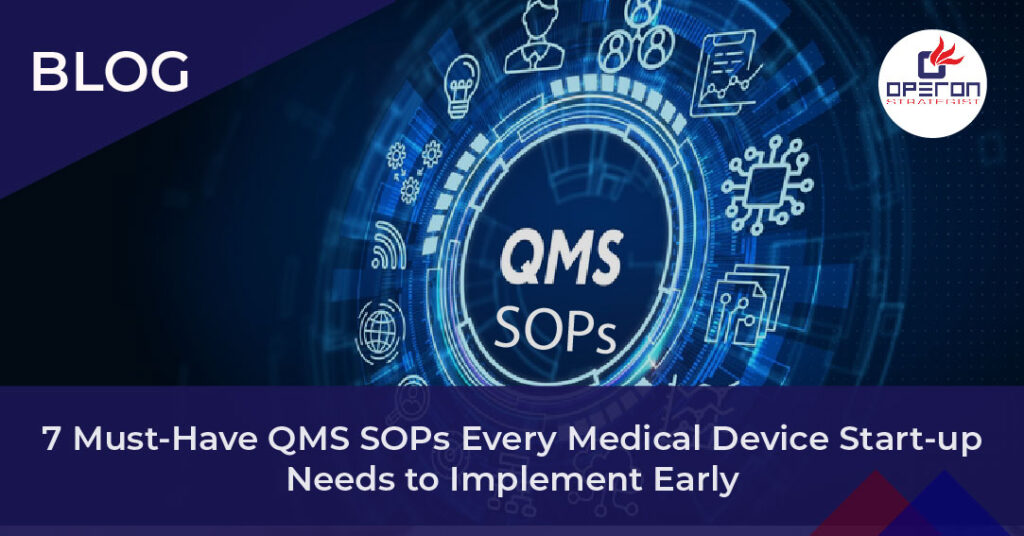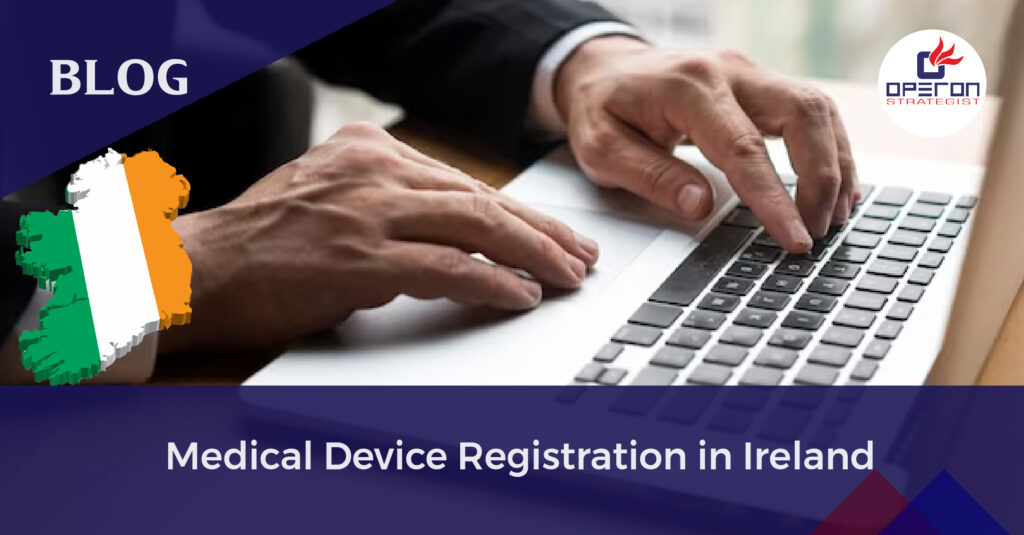QMS SOPs Every Medical Device Start-up Needs to Impement Early
Starting a medical device company is an exciting journey, but it comes with stringent regulatory requirements that must be met to ensure product quality and patient safety. A well-structured medical device Quality Management System (QMS) is the foundation for achieving compliance with international standards like ISO 13485 and regulatory bodies like the FDA.
For start-ups, setting up an entire QMS from scratch can be overwhelming. Instead of tackling all Standard Operating Procedures (SOPs) at once, you should focus on implementing a few critical SOPs early on. These will provide the framework for operational efficiency and regulatory compliance.
Here are the 7 must-have QMS SOPs that every medical device start-up should prioritize to ensure a smooth launch and compliance from the beginning:
Looking For a Medical Device Regulatory Consultant?
Let’s have a word about your next project
7 Must-Have QMS SOPs Every Medical Device Start-up Needs to Implement Early
1. Design and Development SOP
Why it’s important:
The design and development process forms the backbone of your product’s journey, ensuring that your medical device meets regulatory and market requirements. This SOP will guide your team through each phase of development, from design inputs and outputs to verification and validation.
What to include:
- Design controls and documentation
- Risk management during the design phase
- Design reviews and approvals
Why prioritize it early:
Getting your design and development processes right from the start ensures that your device development is systematic, compliant, and prepared for regulatory scrutiny. Early implementation also helps avoid costly redesigns or delays later on.
2. Medical Device File (Device Master Record) SOP
Why it’s important:
The Medical Device File, or Device Master Record (DMR), holds all the documentation related to the device’s design, manufacturing, and testing. This SOP ensures that your product’s lifecycle is well-documented and traceable.
What to include:
- Specifications and drawings
- Manufacturing and assembly instructions
- Inspection and test procedures
Why prioritize it early:
A well-organized DMR is essential for both regulatory submissions and audits. It ensures that your product details are accurate and up-to-date, providing a comprehensive view of the device’s journey from design to market.
3. Employee Training SOP
Why it’s important:
Employee competency is critical in the medical device industry, where regulatory compliance and product quality are directly tied to how well your team understands their roles. This SOP ensures that all employees receive proper training on regulatory requirements, processes, and procedures.
What to include:
- Initial and ongoing training requirements
- Documentation of training records
- Competency assessments
Why prioritize it early:
An informed and trained workforce is crucial to maintaining quality and avoiding costly errors. Setting up training programs early ensures that your team is compliant from day one.
4. Document Control SOP
Why it’s important:
A robust document control system ensures that all your QMS-related documents are properly managed, approved, and accessible. This SOP defines how documents are created, reviewed, approved, revised, and archived.
What to include:
- Procedures for document creation and review
- Version control and tracking
- Access control and archiving
Why prioritize it early:
Without proper document control, you risk falling out of compliance with regulatory standards. Early implementation ensures that all critical documents are traceable, up-to-date, and ready for inspection at any time.
5. Process Validation SOP (Including Software Validation)
Why it’s important:
Process validation ensures that your manufacturing processes consistently produce products that meet regulatory and safety standards. If software is used during manufacturing or testing, it must be validated to ensure reliability.
What to include:
- Process validation protocols
- Acceptance criteria and validation methods
- Ongoing process monitoring and revalidation
Why prioritize it early:
Process validation minimizes the risk of non-conforming products. Implementing this SOP early ensures that your production processes are well-documented and capable of delivering consistent quality.
6. Risk Management SOP
Why it’s important:
Risk management is crucial for identifying, evaluating, and mitigating risks throughout the product lifecycle. This SOP ensures that potential hazards are addressed proactively, protecting both the end-users and the company.
What to include:
- Hazard identification and risk analysis
- Risk mitigation strategies
- Ongoing risk assessments as part of the product lifecycle
Why prioritize it early:
Addressing risks early in the product development process helps prevent potential safety issues and regulatory challenges down the road. It is also a key requirement for regulatory submissions and audits.
7. Supplier Approval and Management SOP
Why it’s important:
Your suppliers play a crucial role in the quality of your medical device. This SOP ensures that you carefully vet, approve, and continuously monitor your suppliers to guarantee that all components and materials meet regulatory requirements.
What to include:
- Supplier qualification criteria
- Supplier audits and performance evaluations
- Ongoing supplier monitoring and requalification
Why prioritize it early:
Early establishment of supplier approval procedures minimizes the risk of receiving substandard materials that could jeopardize your device’s quality and compliance.
Why Early Implementation of These QMS SOPs Matters
For any start-up medical device company, early implementation of these seven must-have SOPs is crucial for:
- Regulatory compliance: Ensuring alignment with ISO 13485, FDA QSR, and other relevant standards.
- Operational efficiency: Establishing well-defined processes that streamline design, development, and manufacturing activities.
- Risk reduction: Identifying and addressing potential risks before they impact product quality or safety.
Audit preparedness: Being ready for regulatory inspections and audits by maintaining a traceable, compliant QMS.
Get Expert Medical Device QMS Support from Operon Strategist Today!
Conclusion
As a medical device start-up, establishing a well-structured QMS is not just a regulatory requirement but a strategic decision that will drive your success. Focusing on these 7 must-have SOPs will give you the solid foundation needed to grow while maintaining product quality and compliance. Prioritize these SOPs early to reduce risks, avoid compliance pitfalls, and streamline your path to regulatory approval.
Need help setting up your QMS procedures? Contact Operon Strategist today for expert regulatory consulting and turnkey project management services tailored to medical device companies.



